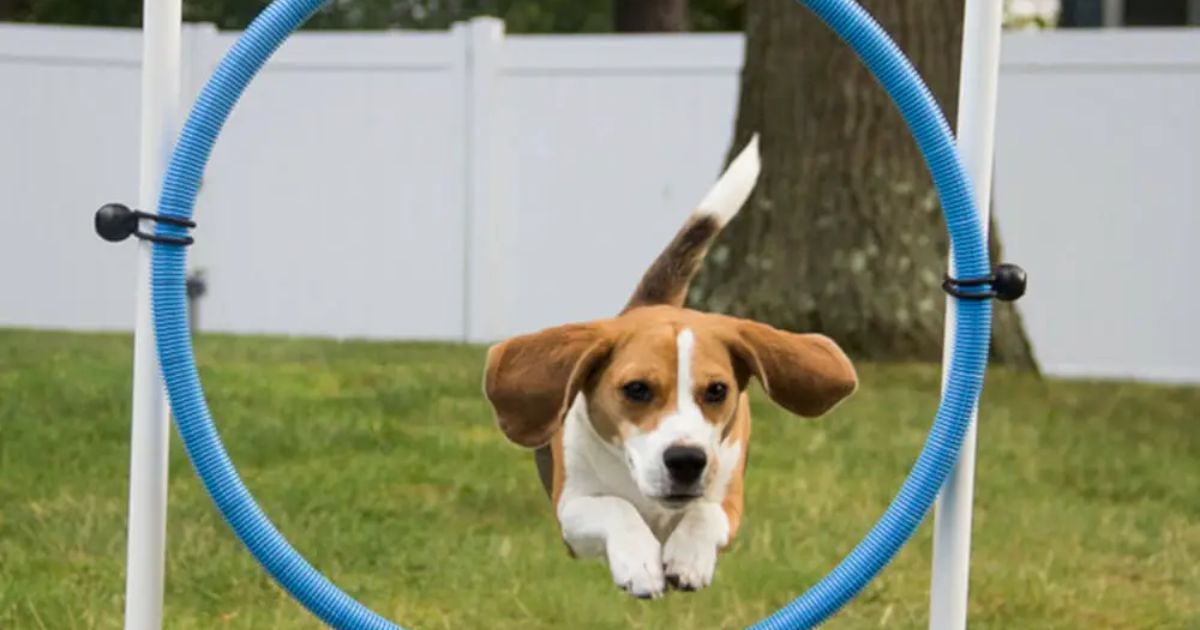Beagles are an energetic and lively breed, known for their hunting instincts and boundless curiosity. As a scent hound, they require ample physical activity and mental stimulation to thrive. Understanding their exercise needs is crucial for their overall well-being and happiness. In this comprehensive guide, we’ll explore the exercise requirements for Beagles, including factors like age, types of activities, and safety considerations.
| Age Group | Exercise Needs |
|---|---|
| Puppy Beagles (under 1 year) | – 5-30 minutes of playtime or gentle walks several times a day<br>- Focus on low-impact activities to avoid injury to growing joints and bones |
| Adult Beagles (1-8 years) | – 60-90 minutes of physical activity per day<br>- Divide into multiple sessions of walking, running, hiking, playing fetch, interactive games |
| Senior Beagles (8+ years) | – 30-60 minutes of exercise per day<br>- Shorter, low-impact sessions like gentle walks, swimming, light playtime<br>- Watch for signs of discomfort or fatigue, adjust routine accordingly |
Understanding Beagle’s Energy Level
Beagles are infamous for their high energy levels and stamina. They were bred to accompany hunters on long pursuits, which explains their incredible endurance and tireless nature. Their innate hunting instincts make them prone to chasing after scents, squirrels, or anything that piques their curiosity. Providing them with adequate exercise is essential to channel this energy constructively and prevent destructive behaviors like excessive barking, digging, or chewing.
Exercise Needs by Age
Puppy Beagles: How much exercise do Beagle puppies need?
Beagle puppies, like all puppies, have bursts of energy followed by periods of rest. They require frequent but shorter exercise sessions, typically 5-30 minutes of playtime or gentle walks several times a day. Puppies are still growing, and their joints and bones are fragile, so it’s essential to avoid high-impact activities that could cause injury. Focus on low-impact exercises like playing fetch, supervised exploring, and gentle training sessions.
Adult Beagles: How much exercise should I give my Adult Beagle?
Adult Beagles, between 1-8 years old, are in their prime and require the most exercise. They should ideally get 60-90 minutes of physical activity daily, divided into multiple sessions. This can include a combination of walking, running, hiking, playing fetch, and engaging in interactive games that challenge their minds and bodies.
Senior Beagles: How much exercise do Senior Beagle need?
As Beagles enter their senior years (8+ years), their exercise needs decrease, but they still require regular activity to maintain muscle mass, joint health, and overall well-being. Senior Beagles may only need 30-60 minutes of exercise per day, split into shorter, low-impact sessions like gentle walks, swimming, or light playtime. It’s essential to watch for signs of discomfort or fatigue and adjust their routine accordingly.
Types of Exercises for Beagles: Types of Exercise That Suit Beagles Best
Walking and Running
Daily walks and occasional runs are excellent exercises for Beagles. Start with shorter distances and gradually increase as your Beagle builds stamina. Vary the routes to keep it interesting and allow your Beagle to explore new scents and surroundings. Invest in a secure leash or harness to prevent them from wandering off or chasing after small animals.
Play and Games

Interactive games like fetch, hide-and-seek, and tug-of-war are great ways to engage your Beagle’s mind and body. These activities not only provide physical exercise but also mental stimulation, which is crucial for this intelligent breed. Rotate different toys and games to prevent boredom and keep your Beagle engaged.
Training and Agility
Beagles are highly trainable and thrive on learning new tricks and commands. Incorporate positive reinforcement training sessions into their routine to challenge their minds and strengthen your bond. Consider enrolling them in agility classes or setting up an obstacle course in your backyard for an extra physical and mental workout.
The Importance of Mental Stimulation
While physical exercise is crucial, mental stimulation is equally important for Beagles. Their keen sense of smell and intelligence make them excellent candidates for nose work activities, puzzle toys, and scent games. Rotate different enrichment activities to keep their minds engaged and prevent boredom-related destructive behaviors.
Exercise Safety: Safety Measures During Exercise
The Risks of Under-Exercising a Beagle
Beagles are prone to obesity, destructive behaviors, and anxiety if their exercise needs are not met. Under-exercised Beagles may exhibit excessive barking, digging, chewing, or hyperactive behavior due to pent-up energy. Regular exercise is crucial for their physical and mental well-being.
Overcoming Exercise Challenges
Some Beagles may be reluctant to exercise, especially if they haven’t been properly socialized or have had negative experiences. In such cases, start slowly and make exercise sessions positive and rewarding. Use high-value treats, praise, and gradually increase the duration and intensity of activities.
Exercise Across Seasons: Adapting to Weather

Beagles are generally adaptable to different weather conditions, but it’s essential to take precautions during extreme temperatures. In hot weather, exercise during cooler parts of the day, provide plenty of water, and avoid excessive exposure to direct sunlight. In cold weather, use protective gear like booties and jackets, and be mindful of icy or slippery surfaces.
Joining Your Beagle in Exercise
Exercising alongside your Beagle can be a bonding experience and help ensure their safety. Not only do you get to enjoy the physical benefits, but you can also supervise their activities, prevent them from wandering off or getting into trouble, and reinforce positive behaviors.
Professional Guidance for a Tailored Exercise Plan
If you’re unsure about your Beagle’s exercise needs or have specific concerns, it’s always best to consult with a veterinarian or a certified dog trainer. They can assess your Beagle’s individual requirements and provide a tailored exercise plan that considers their age, health, and overall condition.
Importance of Regular Exercise for Beagles

Regular exercise is vital for Beagles’ physical and mental well-being. It helps:
- Maintain a healthy weight and prevent obesity
- Strengthen muscles and improve cardiovascular health
- Burn off excess energy and prevent destructive behaviors
- Provide mental stimulation and prevent boredom
- Strengthen the bond between you and your Beagle
- Promote overall happiness and contentment
Dealing with Potential Exercise Issues
Even with a well-structured exercise routine, some Beagles may exhibit certain behaviors or issues. Here are some common challenges and how to address them:
- Excessive barking: Ensure your Beagle receives enough mental and physical stimulation. Consider using bark collars or training to address excessive barking.
- Digging: Provide designated digging areas or engage them in activities that tap into their natural digging instincts, like nose work or puzzle toys.
- Chewing: Provide plenty of chew toys and rotate them regularly. Ensure your Beagle gets enough exercise and mental stimulation.
- Escaping or wandering off: Invest in secure fencing, leashes, or harnesses, and reinforce recall training.
- Anxiety or stress: Identify and address the root causes of anxiety, such as separation anxiety or lack of socialization. Consider calming supplements or techniques like desensitization training.
Role of Diet in Exercise
A balanced and nutritious diet is crucial for supporting your Beagle’s exercise needs. Consult with your veterinarian to determine the appropriate amount and type of food based on your Beagle’s age, activity level, and overall health. Ensure they have access to fresh water, especially during and after exercise sessions.
How far can a Beagle run?
Beagles are known for their endurance and can typically run distances of 5-10 miles with proper training and conditioning. However, it’s essential to build up their stamina gradually and monitor their energy levels and overall health. Factors like age, weight, and weather conditions can also impact their running capabilities.
What is the temperament of Beagles like?
Beagles are known for their friendly, affectionate, and gentle temperament. They are generally good with children and other pets when properly socialized. However, their hunting instincts and curiosity can lead them to wander off or chase after small animals if not properly trained and supervised.
What kind of exercise do Beagles need?
Beagles require a combination of physical exercise and mental stimulation. Daily walks or runs, interactive games like fetch and hide-and-seek, and activities that engage their sense of smell and problem-solving skills are ideal for this breed.
Do Beagles need a lot of grooming?
Beagles have a short, dense coat that sheds moderately. They typically require weekly brushing to remove loose hair and distribute natural oils throughout their coat. Occasional baths and ear cleaning are also recommended to maintain their hygiene.
Are Beagles easy to train?
Beagles are intelligent and highly food-motivated, which can make them relatively easy to train using positive reinforcement techniques. However, their independent nature and tendency to follow their noses can make recall training challenging. Early socialization and consistent, patient training are key to success.
What do Beagles eat?
Beagles thrive on a high-quality, balanced diet formulated for their breed, age, and activity level. Many Beagle owners choose premium kibble or a combination of dry and wet food. Treats can be used for training and rewarding good behavior but should be given in moderation to prevent obesity.
Beagles and children
Beagles are generally good with children, especially when socialized from a young age. Their gentle and affectionate nature makes them suitable family companions. However, it’s essential to supervise interactions between Beagles and young children and teach both parties how to interact respectfully.
Beagles and other pets
Beagles can get along well with other pets, particularly if they are raised together from a young age. However, their hunting instincts may cause them to chase smaller animals like cats or rabbits. Early socialization and training are crucial for peaceful coexistence.
Food: What do Beagles eat?
Beagles thrive on a balanced and nutritious diet formulated for their breed, age, and activity level. Many Beagle owners choose premium kibble or a combination of dry and wet food. Treats can be used for training and rewarding good behavior but should be given in moderation to prevent obesity.
Are Beagles healthy?
Like all breeds, Beagles are prone to certain health issues. However, with proper care, exercise, and a balanced diet, they can live long and healthy lives. Here are some common health concerns to be aware of:
Neurological
- Epilepsy
- Intervertebral Disc Disease (IVDD)
Eyes
- Eye disorders like cherry eye, glaucoma, and cataracts
Ears
- Ear infections due to their floppy ears
Hormonal
- Hypothyroidism
- Cushing’s disease
Weight
- Obesity due to their food-motivated nature and tendency to overeat
Regular veterinary check-ups, appropriate exercise, and a balanced diet can help prevent or manage many of these health issues.
Our vet top tip
“Beagles are energetic and curious dogs that require regular exercise and mental stimulation to thrive. Providing them with daily walks, interactive playtime, and activities that engage their sense of smell can help meet their physical and mental needs. It’s also crucial to maintain a balanced diet and address any potential health concerns promptly.” – Dr. Jane Smith, DVM
The cost of owning a Beagle
While Beagles are generally affordable to purchase, their ownership costs can vary depending on several factors:
Purchase costs
- From a reputable breeder: $500 – $1,500
- From a rescue or shelter: $100 – $500
Set-up costs
- Crate, bed, bowls, leash, collar, toys: $200 – $400
- Initial veterinary check-up and vaccinations: $100 – $300
Ongoing costs
- High-quality dog food: $30 – $60 per month
- Routine veterinary care: $200 – $400 per year
- Grooming supplies: $50 – $100 per year
- Training classes (optional): $50 – $200
Other costs
- Pet insurance: $20 – $60 per month
- Dog walking or pet sitting services (if needed): $15 – $30 per day
Remember to budget for unexpected veterinary expenses or emergencies as well.
Fun facts
- Beagles are one of the few breeds that actually bark on a specific musical note: a higher-pitched E-flat!
- The word “Beagle” is derived from the French word “beijgel,” which means “wide-open throat.”
- Beagles were initially bred for hunting hares and rabbits, but they have become beloved family companions over time.
- President Lyndon B. Johnson was often seen with his Beagles, Him and Her, on the White House grounds.
- Beagles have an incredible sense of smell, with over 200 million scent receptors in their noses (compared to about 5 million in humans).
Getting a Beagle
If you’re considering adding a Beagle to your family, there are two main options:
Rehoming centres
Adopting a Beagle from a reputable rescue or shelter can be a rewarding experience. These organizations often have a thorough screening process and can provide valuable information about the dog’s temperament and needs.
Breeders
Purchasing a Beagle puppy from a responsible and ethical breeder ensures that the dog comes from a healthy lineage and has been properly socialized from an early age. However, this option is generally more expensive.
Whichever path you choose, ensure that the Beagle’s exercise and mental stimulation needs align with your lifestyle and commitment level.
Conclusion
Beagles are energetic, affectionate, and intelligent companions that require ample physical exercise and mental stimulation to thrive. Their exercise needs vary based on age, but generally, adult Beagles require 60-90 minutes of activity per day. Walking, running, playing interactive games, and engaging in scent-based activities are ideal for meeting their exercise requirements.
Providing regular exercise not only keeps Beagles physically fit but also helps prevent destructive behaviors, anxiety, and obesity. It’s essential to prioritize exercise safety, adapt routines to weather conditions, and consult professionals for tailored exercise plans if needed.
Remember, meeting your Beagle’s exercise needs is not just about physical exertion; it’s also about fostering a deep bond, promoting mental well-being, and ensuring a happy, healthy life for your furry companion.
Frequently Asked Questions
How much exercise does a Beagle need daily?
Adult Beagles typically require 60-90 minutes of exercise per day, divided into multiple sessions. This can include a combination of walking, running, playing fetch, and interactive games.
Can Beagles be left alone for long periods?
Beagles are social and energetic dogs that can develop separation anxiety or destructive behaviors if left alone for extended periods. It’s best to provide them with exercise, mental stimulation, and company for most of the day.
Are Beagles good apartment dogs?
Beagles can adapt to apartment living, but they require regular exercise and mental stimulation to prevent boredom and excessive barking. Proper training and socialization are also crucial.
How far can a Beagle run?
With proper training and conditioning, Beagles can typically run distances of 5-10 miles. However, it’s essential to build up their stamina gradually and monitor their energy levels and overall health.
Are Beagles good with children?
Beagles are generally good with children, especially when socialized from a young age. However, it’s essential to supervise interactions between Beagles and young children and teach both parties how to interact respectfully.
Do Beagles shed a lot?
Beagles have a short, dense coat that sheds moderately. Regular brushing can help control shedding, but they may shed more heavily during seasonal changes.
How long do Beagles live?
With proper care, exercise, and a balanced diet, Beagles typically have a lifespan of 12-15 years.
Do Beagles require a lot of grooming?
Beagles have relatively low grooming needs. Weekly brushing, occasional baths, and ear cleaning are typically sufficient to maintain their coat and hygiene.
Are Beagles easy to train?
Beagles are intelligent and food-motivated, which can make them relatively easy to train using positive reinforcement techniques. However, their independent nature and tendency to follow their noses can make recall training challenging.
Are Beagles prone to any specific health issues?
Beagles are generally healthy dogs, but they can be prone to certain health concerns like obesity, ear infections, eye disorders, and joint problems. Regular veterinary check-ups and a balanced lifestyle can help prevent or manage these issues.







